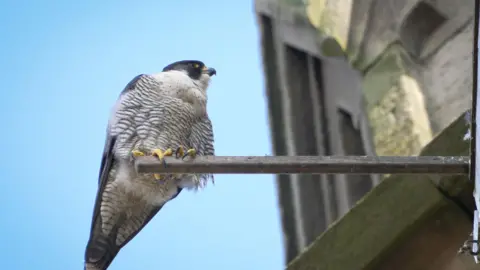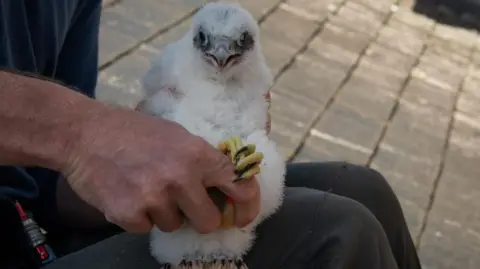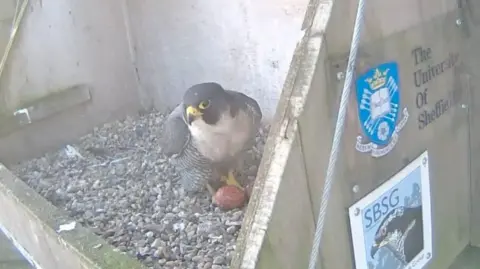Peregrine falcons return to city nesting spot
 Billy Clarke
Billy ClarkeBirdwatchers have expressed delight at the return of a pair of peregrine falcons to an inner city nest in Sheffield where four eggs have been laid in the past week.
The birds use an artificial platform at St George's Church on Mappin Street, which was installed in 2012 by the University of Sheffield and Sheffield Bird Study Group to create an urban nesting space.
The first egg of the year was laid on 17 March by a female who has been nesting at the site since 2020.
The church, currently used as a university lecture hall, has seen 34 chicks fledge successfully, with 40,000 viewers tuning into a 24-hour livestream of the nest every year to watch them grow.
 Chris Greenwood
Chris GreenwoodChris Greenwood, a trustee at the Sheffield Bird Study Group said: "It's fantastic to have such an iconic species in such an accessible place for humans to appreciate.
"There's an opportunity to come down and look in person with a pair of binoculars, or watch them on the webcams, and I think that's a great way of engaging people with nature."
 University of Sheffield
University of SheffieldThe peregrine population in the UK hit a low point in the 1960s due to human persecution and the impact of pesticides in the food chain, according to the RSPB.
However, improved legislation and protection has helped the birds to recover and they have now expanded into many urban areas.
While peregrines historically live on cliffs , the church's height makes the spot an ideal nesting place.
Eighteen-year-old zoology student Freya Dunbar-Simms, who chose to study at the University of Sheffield after spotting the peregrines during an open day last year, has been enlisted to help monitor the nest.
She said: "I'll be coming down whenever I can after lectures to watch them in person.
"I think it's just so important to help protect them and research them, so it's great to be able to get involved."
The eggs are expected to hatch by the end of April, after which experts from the group will scale the church to ring the chicks and record their measurements, aiding scientific research into the birds.
Listen to highlights from South Yorkshire on BBC Sounds, catch up with the latest episode of Look North
